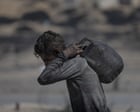
The United States has recently taken significant steps by imposing sanctions on three Palestinian human rights groups. This decision by the U.S. Treasury Department is in response to these groups’ appeal to the International Criminal Court (ICC) to investigate Israel over allegations of genocide in Gaza. The tides of international diplomacy have once again shifted, drawing attention to the delicate balance of justice, politics, and human rights.
At the heart of this issue are the Palestinian Centre for Human Rights and Al Mezan Center for Human Rights, both based in Gaza, along with Al-Haq, a Ramallah-based organization. These groups have been at the forefront of documenting human rights conditions and advocating for accountability in the region. Their call to the ICC underscores ongoing concerns about the humanitarian situation in Gaza and seeks an objective judicial examination into alleged war crimes.
The U.S. sanctions designate these organizations under provisions related to the ICC, marking a significant intervention by the United States in the complex landscape of international law and national sovereignty. The rationale behind these sanctions aligns with a broader context of U.S. policy, which has traditionally supported Israel and expressed reservations about international legal actions perceived to target its ally.
This measure by the U.S. resonates within a wider geopolitical narrative, where legal and diplomatic actions are intricately interwoven. While the U.S. supports international legal norms, it often grapples with the potential implications such investigations might have on its own foreign relations and strategic alliances. These sanctions highlight a continuing pattern where political considerations can sometimes intersect with judicial processes in ways that influence international discourse and action.
The journey of these Palestinian human rights groups is emblematic of broader efforts to seek justice and accountability through international legal systems. Their appeal to the ICC is part of a larger movement to leverage global institutions to address local grievances and alleged human rights violations. Their work presents a complex picture—one where the pursuit of justice often collides with political realities, yet also where resilience and hope persist.
For many who watch these developments, the sanctions imposed could raise questions about the effectiveness and fairness of international legal frameworks. How does the international community balance power dynamics with the pursuit of justice? How do nations navigate the tensions between protecting sovereignty and upholding collective standards of human rights?
Observers note that the situation in Gaza and the broader Israeli-Palestinian conflict remain pivotal issues in global politics, consistently drawing attention and action from a host of international actors. The involvement of the ICC, with its mandate to investigate serious international crimes, adds a layer of judicial complexity to political disputes that are already fraught with historical tension and conflict.
As this situation continues to unfold, the role of international human rights organizations remains crucial. They stand as advocates for transparency and accountability, working tirelessly to bring light to issues that might otherwise remain obscured. Their contributions, often fraught with challenges, are vital to the ongoing dialogue about rights, justice, and peace in regions marked by prolonged conflict.
The path ahead is uncertain, yet filled with potential for growth and reflection. It invites nations, leaders, and individuals to engage with these issues with an open heart and a commitment to dialogue. In doing so, there is hope that a mindful approach can foster understanding and ultimately contribute to peace and reconciliation in the region.
Source: {link}
